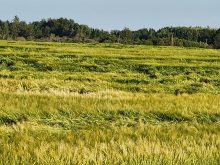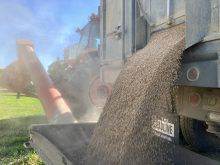Reuters / The drought gripping the U.S. Plains has not killed prospects for a large harvest of winter wheat, and some rain could quickly turn things around, analysts and agronomists said.
“Just because we go into dormancy lacking rain, not looking too hot, it does not ensure that we are going to have a bad crop,” Linn Group analyst Jerrod Kitt said on a panel discussion. “There is still a lot of time to really improve that situation. The hard red winter wheat crop prospects are hurting but they are not set in stone.”
Read Also

Cabbage seed pod weevil the surprise top canola pest in Manitoba for 2025
Get set to scout this summer. After a few years of low profile in Manitoba, cabbage seed pod weevil populations, among a few other pests, boomed here in 2025.
The latest crop conditions report from Kansas, which produces about one-fourth of U.S. winter wheat, show that good to excellent ratings deteriorated to 20 per cent by the end of January, down four percentage points from the end of December.
Conditions in Nebraska, another hard red winter wheat-growing area, fell to eight per cent good to excellent by the end of January from 14 per cent a month earlier. Not all states provide crop conditions updates during the winter.
The Kansas crop has shown remarkable resiliency in past years. In 2003, hard red winter wheat ratings were just 33 per cent good to excellent at the end of January, the third-lowest January rating of the last 11 years. Good-to-excellent ratings rebounded to 52 per cent by the start of May and final yields that year were 48 bushels per acre, the state’s second-highest on record.
But without rain, the crop will suffer throughout the spring and limit the size of harvest. In 2011, Kansas wheat was rated 27 per cent good to excellent, a rating that fell to 21 per cent by the beginning of May. Final yields were just 35 bushels per acre that year, 22 per cent lower than in 2010.
“Wheat is quite pliable in that it can be hurting one week and then the next week is fine,” said Jim Shroyer, extension crops specialist at Kansas State University. “It cannot do that all the way through the year. There comes a day of reckoning.”
















